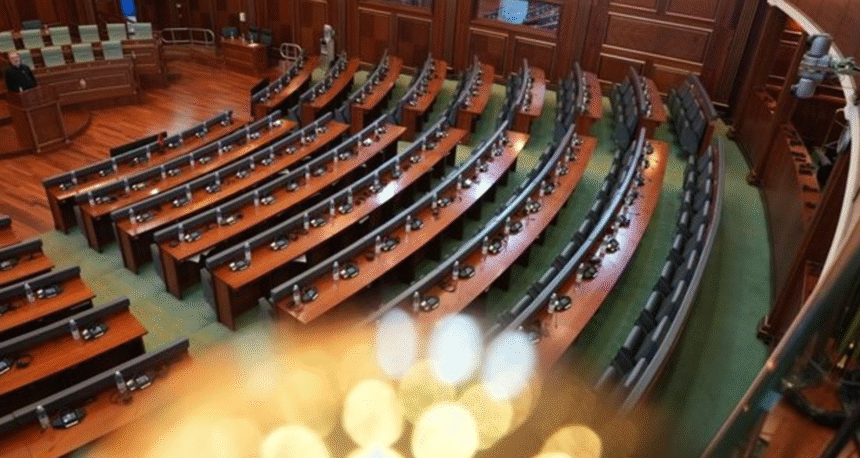Kosovo’s political parties in the ninth legislature of the Assembly of Kosovo have officially appointed their parliamentary group leaders, as the country continues to face months of political stalemate without a fully functioning government.
According to information obtained by KALLXO.com from sources within the Assembly, the Vetëvendosje Movement (VV) has appointed Mimoza Kusari-Lila as the head of its Parliamentary Group. Kusari-Lila was also nominated for ministerial office in the proposed “Kurti 3” government — a proposal that was rejected on October 26, 2025.
During the nomination of Glauk Konjufca as prime minister, Albin Kurti, leader of Vetëvendosje, declared that only one change would be made in the cabinet — a role swap between him and Konjufca.
“Let us continue with the same cabinet I proposed. I will take Glauk’s position, and Glauk will take mine, as we agreed last night,” said Kurti during the party’s General Council meeting on November 4, 2025.
This means that in the proposed “Konjufca 1” cabinet, Kusari-Lila is expected to serve as Minister of Trade, Industry, and European Integration.
In a statement to KALLXO.com, Kusari-Lila confirmed her leadership role “until further notice”, adding that the decision was made for organizational continuity within the party.
“It’s about ensuring coordination and avoiding unnecessary procedural delays,” she explained.
Meanwhile, the Democratic Party of Kosovo (PDK) has appointed Abelard Tahiri as its parliamentary group leader. The Democratic League of Kosovo (LDK) selected Hykmete Bajrami as group leader and Armend Zemaj as deputy leader.
From the Multiethnic Group, Elbert Krasniqi has been chosen as leader, with Albert Kinolli serving as his deputy. Krasniqi previously held the position of Minister of Local Government Administration in the “Kurti 2” government.
However, the Alliance for the Future of Kosovo (AAK) and NISMA Socialdemokrate cannot form official parliamentary groups as they lack the minimum of six MPs required. AAK currently has five deputies, while NISMA holds three. AAK had previously included Adem Hoxha, a Goran MP, but expelled him after he supported the Serbian List’s petition to the Constitutional Court.
According to KALLXO.com’s sources, the Serbian List has not proposed a leader for its parliamentary group. The party is still awaiting a Constitutional Court ruling on the election of the Assembly’s deputy speaker from the Serbian community, an issue that has further delayed institutional functionality.
On November 4, 2025, the Vetëvendosje General Council officially nominated Glauk Konjufca for Prime Minister. Shortly after, President Vjosa Osmani formally mandated Konjufca, starting the 15-day constitutional period to form a government.
“We have no other candidate besides Glauk Konjufca,” President Osmani stated. “This decision is in line with my duty to preserve national stability and avoid new elections.”
Following his nomination, Konjufca emphasized that his government would not pursue long-term coalitions, focusing instead on preventing new elections and securing the 2026 state budget.
“The goal is clear — avoid new elections and ensure Kosovo gets its 2026 budget,” said Konjufca.
However, the opposition parties PDK, LDK, AAK, and NISMA have rejected Vetëvendosje’s proposal, calling it a stalling tactic rather than a genuine attempt to stabilize governance.
Kosovo has now spent nine months without new institutions, following the February 9, 2025 elections.
The first mandate, given to Albin Kurti, failed after his “Kurti 3” government proposal received only 56 votes in the Assembly.
Meanwhile, the Constitutional Court is still reviewing the Serbian List’s appeal concerning the deputy speaker’s election, leaving uncertainty over whether the current Assembly can be officially recognized as constituted.
Analysis: A Fragile Political Landscape
Kosovo’s prolonged institutional paralysis highlights the fragility of its democratic framework. While Vetëvendosje struggles to maintain power through procedural maneuvering, the opposition accuses the party of subverting democratic norms for political gain.
As the Constitutional Court delays rulings, and Belgrade-backed structures exploit Kosovo’s instability, the need for credible leadership and swift resolution becomes ever more urgent.







